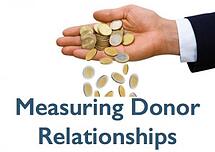 How would you assess the quality of your relationship with the people who donate or invest in your school? Obviously, raising money to fund your vision requires deepening the connection with donors who have the capacity, the conviction, and the commitment to you and the organization.
How would you assess the quality of your relationship with the people who donate or invest in your school? Obviously, raising money to fund your vision requires deepening the connection with donors who have the capacity, the conviction, and the commitment to you and the organization.
The more you know about a donor, the better prepared you are to align with their goals to create a mutually beneficial relationship. Such Donor Intelligence will guide you in preparing your investment proposal and structuring your investment pitch, increasing the likelihood of gaining agreement for a donation and building a long-term relationship.
But how do can you assess donor relationships? How do you know where you stand and how to cultivate a healthy connection? Cultivation includes a wide range of relationship building activities such as telephone calls, pre- and post-event communications, personal visits, and leveraged networking to expand your reach. Below are four ways to measure your relationships with donors.
1. Mutual Control
What is the balance of control that the organization and the donors has over the relationship? Although some imbalance in the control of the donor relationship may occur naturally, healthy relationships require stability and equity in terms who has the power of influence. Your goal is to make sure you both want and expect the same things--being on the same page is very important.
You can enhance your relationship with donors by being genuinely attentive to what they say and developing the habits that demonstrate belief that their opinions are legitimate. Find ways to enhance the listening skills of your team, and appropriately seek the wisdom and involvement of donors in the decision-making processes.
2. Trust
How much does each donor trust you? Your capacity to raise money depends on it!
People want to give. They especially want to give as an investment in education. But too often the feedback from donors isn't good regarding their experiences with school leaders. They want to see and feel a return on their investment, which means they can count on you to keep them informed and respected. They want to be proud of their investment and know that they are better off by giving you their trust and valuable resources.
Trust can actually be measured based on the level of:
* integrity: the donor's belief that you act fairly and justly,
* dependability: the donor's confidence that you will follow through to do what you say you will do, and
* competence: the donor's belief that you have the ability to do what you says you will do.
3. Satisfaction
Are you meeting, and exceeding, their conditions of satisfaction? Each donors has expectations and wants to believe that the benefits of the relationship with you outweighs the costs. Part of your job is to determine how you can meet and exceed the goals of each donor, moving them forward in your continuum of engagement until they become Ambassadors who willingly invite others to invest in your program.
4. Commitment
Is it all worth it? For a donor to be fully engaged in the relationship, they need to feel that giving to you and sustaining a relationship with you is really worth all the effort.
The more you know about a donor, the better prepared you are to meet their goals. Accurately assessing donor relationships is key to fundraising success.


